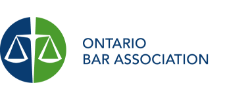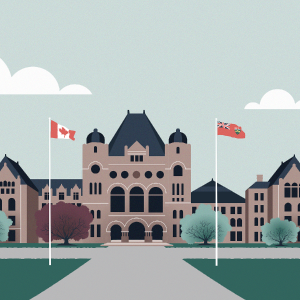1. Objective
Providing Goods and Services to People with Disabilities
The Ontario Bar Association (OBA) shall ensure all of its members, volunteers and clients are able to access and benefit from the products and services it offers. This policy sets out the standards for accessibility that are required and apply to every person who deals with our members, volunteers and clients.
2. Scope
- This policy applies to the provision of goods and services at the areas open to the public at the Ontario Bar Association and its Conference Centre located at 200-20 Toronto Street Toronto, ON M5C 2B8, including but not limited to: professional development programs; meetings; functions; and events.
- This policy applies to Ontario Bar Association employees (full-time, part-time, casual), volunteers, and contract staff (e.g. caterers) who provide goods or services to its members on site or in its Conference Centre or otherwise, and all persons who participate in developing the OBA’s policies, practices and procedures governing the provision of goods and services to its members and members of the public.
3. Definitions
Assistive Device
Assistive Device – is a technical aid, communication device or other instrument that is used to maintain or improve the functional abilities of people with disabilities. Personal assistive devices are typically devices that guests bring with them such as a wheelchair, walker or a personal oxygen tank that might assist in hearing, seeing, communicating, moving, breathing, remembering and/or reading.
Disability
The term disability as defined by the Accessibility for Ontarians with Disabilities Act, 2005, and the Ontario Human Rights Code, refers to: any degree of physical disability, infirmity, malformation or disfigurement that is caused by bodily injury, birth defect or illness and, without limiting the generality of the foregoing, includes diabetes mellitus, epilepsy, a brain injury, any degree of paralysis, amputation, lack of physical co-ordination, blindness or visual impediment, deafness or hearing impediment, muteness or speech impediment, or physical reliance on a guide dog or other animal or on a wheelchair or other remedial appliance or device; a condition of mental impairment or a developmental disability; a learning disability, or dysfunction in one or more of the processes involved in understanding or using symbols or spoken language; a mental disorder; or an injury or disability for which benefits were claimed or received under the insurance plan established under the Workplace Safety and Insurance Act, 1997.
Member
Member refers to any member of the Canadian Bar Association
Clients
Clients are individuals who are not Members of the Canadian Bar Association and who may make use of the OBA meeting facility at 20 Toronto Street, second floor.
Service Animal (Defined in Ontario Regulation 165/16)
An animal is a service animal for a person with a disability if:
- the animal can be readily identified as one that is being used by the person for reasons relating to the person’s disability, as a result of visual indicators such as the vest or harness worn by the animal; or
- the person provides documentation from one of the following regulated health professionals confirming that the person requires the animal for reasons relating to the person’s disability.
- A member of the college of Audiologists and Speech-Language Pathologists of Ontario.
- A member of the college of Chiropractors of Ontario.
- A member of the college of Nurses of Ontario.
- A member of the College of Occupational Therapists of Ontario.
- A member of the College of Optometrists of Ontario.
- A member of the College of Physicians and Surgeons of Ontario.
- A member of the College of Physiotherapists of Ontario.
- A member of the College of Psychologists of Ontario.
- A member of the College of Registered Psychotherapists and Registered Mental Health Therapists of Ontario.
- The person does not have, on hand, the documentation referred to in paragraph b. but indicates they have received such confirming documentation or that confirmation that the person requires the animal for reasons related to the person’s disability is pending.
Support Person (Defined in Ontario Regulation 429/07)
A support person means: in relation to a person with a disability, another person who accompanies him or her in order to help with communication, mobility, personal care, medical needs or access to goods and services.
4. Our Commitment
In fulfilling our customer service objective, The Ontario Bar Association will strive at all times to provide its products and services in a way that respects the dignity and independence of individuals with disabilities. The OBA is also committed to providing people with disabilities the same opportunity to access its products and services as it does for others, and allowing them to benefit from the same services, in the same place and in a similar manner
This Policy shall be reviewed on an annual basis to ascertain whether or not any modifications are required as a result of either statutory or regulatory requirements, or practical/operating experience. The OBA’s Equality Committee will be invited to participate in this review process.
5. Providing Products and Services to People with Disabilities
The Ontario Bar Association is committed to providing excellent products and services to its members, volunteers and clients, and will do so in the following ways:
5.1 Communication
OBA will communicate with people with disabilities in ways that take into account their specific disabilities. Staff, who communicate with our members, volunteers and clients, will be trained on appropriate methods of communication and interaction.
5.2 Services Offered by Telephone
OBA is committed to providing fully accessible telephone service to our members, volunteers and clients. Staff will be trained to communicate with customers over the telephone in clear and plain language and to speak clearly and at an appropriate pace.
OBA will offer to communicate with members, volunteers and clients by e-mail if telephone communication is not suitable to their communication needs or is not available.
5.3 Assistive Devices
OBA is committed to serving people with disabilities who use assistive devices to obtain, use or benefit from our products and services. Staff will be trained to be familiar with various assistive devices or, when required, will secure the necessary support to assist those with disabilities in accessing our products or services.
6. Use of Service Animals and Support Persons
Please Note: Due to the nature of the services provided at the OBA, it is helpful to know 48 hours in advance the number of support persons, or other mobility aids that will be in use during a course or conference so that appropriate tools, equipment, seating, etc. can be arranged efficiently.
OBA is committed to welcoming people with disabilities who are accompanied by a service animal on the parts of our premises that are open to members, volunteers and clients. Staff, volunteers and others dealing with visitors to the Conference Centre will be trained in how to interact with people with disabilities who are accompanied by service animals.
OBA is also committed to welcoming people with disabilities who are accompanied by a support person. Any person with a disability who is accompanied by a support person will be permitted to enter OBA’s Conference Centre with his or her support person. At no time will a person with a disability who is accompanied by a support person be prevented from having access to his or her support person while on OBA premises.
No fees will be charged for support persons, however advance notice of the intention to be accompanied by a support person would be appreciated.
7. Notice of Temporary Disruption
The Ontario Bar Association will provide members, volunteers and clients with as much notice as possible in the event of a planned or unexpected disruption in the facilities or services usually available for people with disabilities. This notice will include information about the reason for the disruption, its anticipated duration, and a description of alternative facilities or services, if available.
The notice will be placed at all entrances and reception areas on our premises and on our website.
8. Training for Staff
The Ontario Bar Association will provide appropriate training to all employees, contract staff, appropriate volunteers, and others who deal with members, other volunteers and clients on its behalf.
Training will be provided to the following:
- All employees of The Ontario Bar Association;
- Volunteers acting in leadership roles who regularly have contact with other members, volunteers and clients;
- The OBA will also require that Catering staff, employed by firms providing food service in the OBA Conference Centre, are appropriately trained by their respective employers.
Training will include the following:
- The purposes of the Accessibility for Ontarians with Disabilities Act, 2005 and the requirements of the customer service standard;
- How to interact and communicate with people with various types of disabilities;
- How to interact with people with disabilities who use an assistive device or require the assistance of a service animal or a support person;
- How to use the wheelchair lift and any other devices available on the OBA’s or the landlord’s premises that may assist with the provision of products and services to people with disabilities;
- What to do if a person with a disability is having difficulty in accessing the OBA’s products and services;
- The Ontario Bar Association’s policies, practices and procedures relating to the customer service standard.
Training schedule:
- This training will be provided at the time of commencement of employment or volunteer activity, and on an annual review basis.
Records of training:
-
The OBA will keep records of the training, including the date on which the training is provided and the number of individuals to whom it is provided. The names of individuals trained will be recorded for training administration purposes.
Staff will be trained on the policies, practices and procedures that affect the way products and services are provided to people with disabilities. Staff will also be trained on an ongoing basis when changes are made to these policies, practices and procedures.
9. Emergency Procedure, Plans or Public Safety Information
Emergency building evacuation drills occur on a regular basis and are conducted by building management. When the fire alarm sounds, or if asked to evacuate by building management, all OBA employees Members and visitors, must leave the building immediately using the stairwells only. Once at the ground floor staff must exit the building via the 20 Toronto Street exit, cross to the other side of the street, and wait on Court Street, beside the restaurant, for further instructions.
Fire Wardens are assigned on each floor of the building occupied by the OBA. All full and part- time staff on the second floor, are trained on the proper evacuation processes. The Fire Wardens can be identified by the orange hats they are wearing and/or the bright vests identifying them as Fire Wardens. On the third floor, the Director of Human Resources & LCI and the Production Room Coordinator will lead any necessary evacuation process. In the absence of one or both, another Director will assume responsibility for the evacuation. All Directors will be trained on the evacuation processes. As in the case on the second floor, Fire Wardens will be easily identifiable as they will be wearing brightly coloured vests identifying them as Fire Wardens.
Conference Centre staff in particular, and all other staff members, shall, on a continuous basis, identify the presence of individuals with physical or other disabilities which may prevent or delay them from evacuating the building in the case of an emergency. Upon identification of such individuals being present in the OBA premises, staff shall notify the floor Fire Warden of their presence and provide whatever assistance is necessary to in order to ensure such individuals are properly notified of an emergency when one occurs, and are safely evacuated from the building, should an emergency require an evacuation.
In the event of an evacuation, a floor Fire Warden will report to building security that there is a person or persons requiring evacuation assistance and shall accompany building security personnel or to assist in escorting such persons out of the building. Individuals who are unable to evacuate the building using the stairwells will be escorted to the general-use elevator foyer and will use elevator number four (4) to gain access to the main floor and then exit the building. If the general-use elevators are not accessible/unsafe, individuals requiring evacuation assistance will be moved to the east stairwell where they will be evacuated by security personnel or firefighters. If the East stairwell is inaccessible/unsafe, the west stairwell will be used instead.
If the evacuation is due to a real emergency and it is, or becomes, necessary to evacuate beyond the Court Street sidewalk opposite the entrance to 20 Toronto Street, the “holding” location to which all staff should proceed is the sidewalk outside St. James Cathedral, on King Street East, just east of Church Street. Once at that location, a Director will provide additional information. Regardless of the time of day an evacuation occurs, staff may NOT to go home or leave either the Toronto Street or King Street evacuation holding points, before checking in with a Director and being directed to do so by a Director.
Emergency evacuation plans shall be available to any member of staff, volunteer or visitor to the OBA’s facilities, upon request and in a format accessible to the individual.
10. Feedback/Complaint Process
The customer service standard objective of The Ontario Bar Association is to meet and/or surpass customer expectations when serving members, volunteers and clients with disabilities. Feedback on our efforts to meet those expectations will be welcomed and appreciated. Such feedback can be provided to the Conference Centre Receptionist or by sending anonymized versions of any concerns with respect to accessibility and requests for accommodation directly to Jon Clancy jclancy@oba.org or Elizabeth Hall ehall@oba.org . All comments received will be reviewed and a response will be provided within a reasonable time period (the objective being 3-5 business days).
Any complaints will be addressed in accordance with previously established complaint categories and complaint management procedures.
11. Notice of Availability of Documents
The OBA, shall, upon request, provide a copy of the policies, practices and procedures required under the AODA regulations 429/07 and 191/11. A copy is available on the OBA’s website at www.oba.org
12. Modifications to this or other policies
The OBA is committed to developing customer service policies that respect and promote the dignity and independence of people with disabilities. Any changes to this policy will be made only after careful consideration of their potential impact on the ability of people with disabilities to access the OBA’s products and services. Any existing OBA policy that fails to respect and promote the dignity and independence of people with disabilities will be appropriately modified or removed.
13. Reporting
The OBA will report on their adherence to the Customer Service Regulation on the Ministry of Community and Social Services website as required.
14. Questions Concerning this Policy
This policy exists to facilitate service excellence to members, volunteers and clients with disabilities. If any questions arise regarding any aspect of this policy, or if the purpose of a policy is not understood, such matters should be referred to the Executive Director & General Counsel, Elizabeth Hall ehall@oba.org or Senior Director of Service Delivery & Innovation, Jon Clancy jclancy@oba.org.










